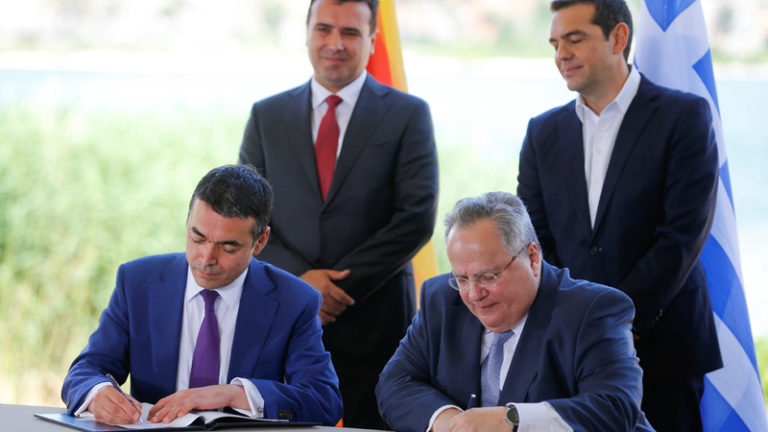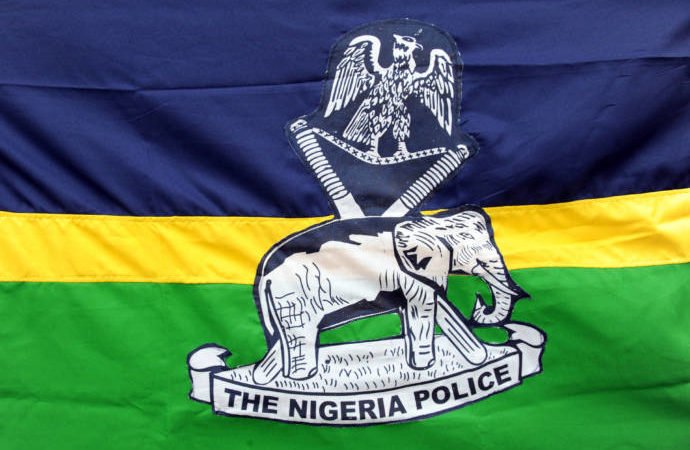The foreign ministers of Greece and Macedonia signed an accord on Sunday to rename the former Yugoslav republic the “Republic of North Macedonia.”
The landmark accord follows decades of inconclusive talks which had soured relations between the two countries and held up the admission of the Balkan state into the EU and NATO, of which Greece is a member.
The agreement still requires the approval of both parliaments and a referendum in Macedonia.
“We have a historic responsibility that this deal is not held in abeyance, and I am confident that we will manage it,” Greek Prime Minister Alexis Tsipras said as he and his Macedonian counterpart Zoran Zaev received a standing ovation from guests at a lakeside ceremony.
Tsipras survived a no-confidence vote mounted by Greece’s opposition in parliament on Saturday, but the depth of public emotion against the deal is strong.
Up to 70 per cent of Greeks object to the compromise, an opinion poll by the Proto Thema newspaper showed on Saturday.
Under the deal, Greece will lift its objections to the renamed nation joining the EU and NATO.
“Our two countries have to turn from the past and look to the future,” Zaev said. “We were bold enough to take a step forward.”
Greece has been in dispute with Macedonia since 1991 over the former Yugoslav republic’s name, arguing it could imply territorial claims over the Greek province of Macedonia and an appropriation of ancient Greek culture and civilisation.
The subject is an emotional one for many Greeks.
On Saturday, thousands of protesters outside the parliament building shouted “Traitor, traitor!” as lawmakers debated inside.
Greece and Macedonia have been at odds over the latter’s name since Macedonia emerged from the disintegrating former Yugoslavia in 1991.
Negotiations took place under UN auspices beginning in 1995.
Greece insisted that the name Macedonia belongs to its northern province and accused Skopje of usurping Hellenic history and even territorial aspirations.
Athens allowed the country to join the UN only with the provisional name of Former Yugoslav Republic of Macedonia.
Under the new deal – announced on Tuesday by Tsipras and Zaev – Greece allowed its neighbour to retain the key part of its name, but with a geographic qualifier: After a complex procedure, which will take months, the country will become the Republic of Northern Macedonia.
Greece will also immediately lift its veto on an invitation for Macedonia to join NATO and also allow the European Union to open membership talks with Skopje.
The UN envoy who mediated the talks for 23 years, Matthew Nimetz, was joined by EU chief diplomat Federica Mogherini and Enlargement Commissioner Johannes Hahn at the signing ceremony.
Hahn tweeted that the agreement would “contribute to peace and stability and hopefully to tangible progress for the EU perspective” of Macedonia.
A day earlier, Tsipras survived a no-confidence motion the opposition launched over the name deal, and Zaev will have to push aside the veto on the ratification by President Gjorge Ivanov.
Macedonia now needs to ratify the deal in the parliament and confirm it with a referendum, presumably in September, and cement the name change into its constitution.
Only after that will Greece also ratify it, as well Macedonia’s membership in NATO.
The agreement enraged nationalists in both countries, who feel that their side has conceded too much. Conservative Macedonian President Gorge Ivanov has promised to veto the agreement even if parliament ratifies it.
A second vote from parliament would allow the vetoed motion to become law.
Greeks opposing the deal protested in Athens on Friday and Saturday, while the Macedonian nationalists scheduled a rally against it in the south-western city of Bitola. (Reuters/NAN)





